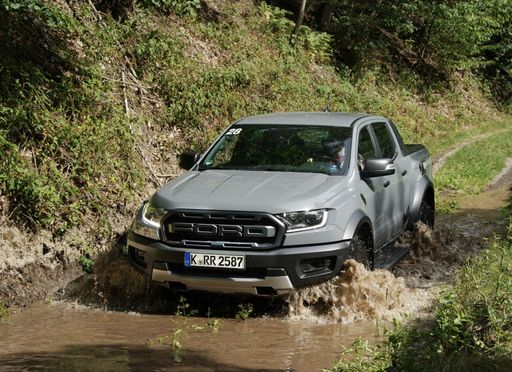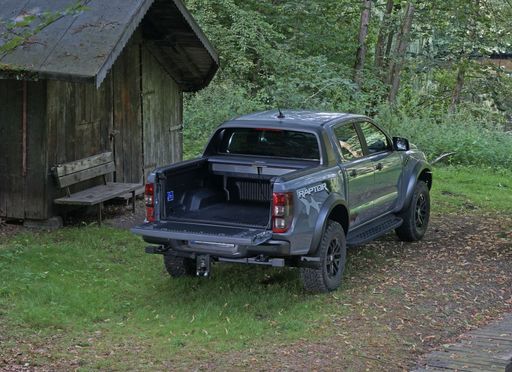Ford Ranger vs McLaren GT Series – Differences & prices compared
Compare performance, boot space, consumption and price in one view.
Find out now: which car is the better choice for you – Ford Ranger or McLaren GT Series?
The Ford Ranger (Pickup) comes with a Diesel, Petrol or Plugin Hybrid engine and Manuel or Automatic transmission. In comparison, the McLaren GT Series (Coupe) features a Petrol engine with Automatic transmission.
When it comes to boot capacity, the Ford Ranger offers , while the McLaren GT Series provides 420 L – depending on how much space you need. If you’re looking for more power, decide whether the 292 HP of the Ford Ranger or the 635 HP of the McLaren GT Series suits your needs better.
In terms of consumption, the values are 3.10 L per 100 km for the Ford Ranger, and 11.90 L for the McLaren GT Series.
Price-wise, the Ford Ranger starts at 34500 £, while the McLaren GT Series is available from 175700 £. Compare all the details and find out which model fits your lifestyle best!
Ford Ranger
The Ford Ranger stands out in the pickup market with its robust build and versatile capabilities, making it a popular choice for both work and leisure. Its modern design is complemented by a well-equipped interior, providing comfort and advanced technology. Whether tackling challenging terrains or cruising through the city, the Ranger delivers a reliable and dynamic driving experience.
details @ media.ford.com
@ media.ford.com
 @ media.ford.com
@ media.ford.com
McLaren GT Series
The McLaren GT Series exemplifies a harmonious blend of luxurious comfort and high-performance engineering, setting a new standard for grand touring vehicles. Its design language is unmistakably McLaren, characterised by sleek lines and an agile stance that promises thrilling driving dynamics. Inside, the spacious cabin offers refined elegance with premium materials, ensuring an exquisite driving experience for both driver and passenger.
details

|
|
|
|
|
Costs and Consumption |
|
|---|---|
|
Price
34500 - 68800 £
|
Price
175700 £
|
|
Consumption L/100km
3.1 - 13.8 L
|
Consumption L/100km
11.90 L
|
|
Consumption kWh/100km
-
|
Consumption kWh/100km
-
|
|
Electric Range
50 km
|
Electric Range
-
|
|
Battery Capacity
11.80 kWh
|
Battery Capacity
-
|
|
co2
70 - 315 g/km
|
co2
270 g/km
|
|
Fuel tank capacity
80 L
|
Fuel tank capacity
72 L
|
Dimensions and Body |
|
|---|---|
|
Body Type
Pickup
|
Body Type
Coupe
|
|
Seats
2 - 5
|
Seats
2
|
|
Doors
2 - 4
|
Doors
2
|
|
Curb weight
2082 - 2486 kg
|
Curb weight
1520 kg
|
|
Trunk capacity
-
|
Trunk capacity
420 L
|
|
Length
5370 - 5420 mm
|
Length
4683 mm
|
|
Width
1918 - 1968 mm
|
Width
2045 mm
|
|
Height
1868 - 1922 mm
|
Height
1213 mm
|
|
Payload
676 - 1108 kg
|
Payload
-
|
Engine and Performance |
|
|---|---|
|
Engine Type
Diesel, Petrol, Plugin Hybrid
|
Engine Type
Petrol
|
|
Transmission
Manuel, Automatic
|
Transmission
Automatic
|
|
Transmission Detail
Manual Gearbox, Automatic Gearbox
|
Transmission Detail
Dual-Clutch Automatic
|
|
Drive Type
All-Wheel Drive
|
Drive Type
Rear-Wheel Drive
|
|
Power HP
170 - 292 HP
|
Power HP
635 HP
|
|
Acceleration 0-100km/h
7.9 - 12.1 s
|
Acceleration 0-100km/h
3.20 s
|
|
Max Speed
180 - 190 km/h
|
Max Speed
326 km/h
|
|
Torque
405 - 697 Nm
|
Torque
630 Nm
|
|
Number of Cylinders
4 - 6
|
Number of Cylinders
8
|
|
Power kW
125 - 215 kW
|
Power kW
467 kW
|
|
Engine capacity
1996 - 2993 cm3
|
Engine capacity
3994 cm3
|
General |
|
|---|---|
|
Model Year
2022 - 2025
|
Model Year
2023
|
|
CO2 Efficiency Class
G, B
|
CO2 Efficiency Class
G
|
|
Brand
Ford
|
Brand
McLaren
|
Ford Ranger
A Comprehensive Look at the Ford Ranger: Versatility Meets Innovation
The Ford Ranger has long been a staple in the world of pick-up trucks, renowned for its robust design and versatility. Whether for rugged off-road adventures or everyday utility tasks, the Ford Ranger continues to be a frontrunner in the pick-up segment. In this article, we explore the technical details and innovative features that set the latest versions of the Ford Ranger apart from its competitors.
Powertrain Performance: A Range of Choices
The Ford Ranger offers a selection of powerful engines, catering to a diverse set of user requirements. Engine options range from the fuel-efficient 2.0-litre EcoBlue diesel engine to the robust 3.0-litre EcoBoost petrol engine, offering impressive outputs from 170 to 292 PS. These engines are paired with either a manual or an advanced automatic transmission, both providing smooth shifting and optimised performance across various driving conditions.
The Ranger’s all-wheel-drive system ensures a robust off-road capability while maintaining a composed ride on urban roads. With torque figures ranging between 405 Nm and 600 Nm, the Ranger guarantees ample pulling power whether you're on or off the beaten track.
Fuel Efficiency and Environmental Considerations
Recognising the importance of balancing performance with efficiency, the Ford Ranger delivers competitive fuel consumption figures ranging from 8.4 to 13.8 litres per 100 km. Despite its robust performance capabilities, the Ranger remains mindful of its environmental footprint, maintaining a functional balance between power and efficiency with a CO2 efficiency class of G.
Advanced Safety and Technology Features
Incorporating cutting-edge technology, the Ford Ranger is equipped with a suite of safety features designed to protect both passengers and payload. Among these are adaptive cruise control, lane-keeping assistance, and a pre-collision assist system, enhancing the driver's ability to navigate both rural roads and busy motorways safely and efficiently.
Moreover, the interior tech suite includes an intuitive infotainment system, complete with connectivity options for seamless integration of smartphones and smart devices. This ensures drivers and passengers can stay connected and entertained on all journeys.
Customisation and Comfort
The Ford Ranger offers a variety of trim levels, allowing customers to tailor the vehicle to their specific needs. From the rugged XL 4x4 to the luxurious Platinum e-4WD Automatik, there is a model to suit every preference and requirement. Equipment lines such as Wildtrak and MS-RT add enhanced styling and additional features for those seeking a more distinctive and upscale appearance.
Inside, the Ranger provides comfortable seating configurations for up to five passengers, with premium materials and ample storage space to ensure every journey is a pleasant experience. Users can also benefit from a range of comfort features, including climate control, premium audio systems, and adjustable seating.
Practicality Meets Payload
The Ford Ranger excels in practicality with its impressive payload capacity and spacious cargo bed, suitable for carrying everything from work equipment to recreational gear. With a maximum payload of up to 1,108 kg, the Ranger is more than capable of handling heavy loads, making it an ideal choice for both professional and personal use.
Additionally, the robust chassis and durable build quality provide long-lasting performance even under the most demanding conditions, ensuring reliability and endurance in the long term.
Conclusion: A Resilient Companion for All Terrains
With its capable engine choices, outstanding off-road capabilities, and a host of advanced features, the Ford Ranger continues to lead the way in the pick-up truck category. Whether for practical utility, adventurous pursuits, or simply as a reliable daily vehicle, the Ranger delivers on all fronts – a true testament to Ford’s commitment to innovation and quality in the automotive industry.
McLaren GT Series
Discovering the McLaren GT Series: The Epitome of Grand Touring Excellence
The McLaren GT Series stands as a testament to the synthesis of luxury and performance, redefining what a grand tourer can be. With engineering prowess and innovative design, McLaren continues to craft vehicles that excite and inspire those who have the privilege of sitting behind the wheel.
Unleashing Power: The Heart of the McLaren GT
At the heart of the McLaren GT Series lies a robust 4.0-litre twin-turbocharged V8 engine, producing an exhilarating 620 PS (456 kW). This automotive marvel accelerates from 0 to 100 km/h in just 3.1 seconds, demonstrating its breathtaking power. Additionally, with a maximum speed of 326 km/h, the McLaren GT is engineered to satisfy those with a thirst for velocity, while offering the refined performance that defines a grand tourer.
Precision Engineering: The Manual-Free Experience
Equipped with an advanced automatic transmission featuring a refined dual-clutch system, this GT offers seamless shifting capabilities, optimising performance and efficiency. The precise engineering of the 7-speed automatic transmission ensures drivers experience the thrill of McLaren’s dynamic capabilities without interruption, maintaining focus on the road ahead.
Design Meets Functionality: A Balance of Form and Space
Featuring an aerodynamic coupe body, the McLaren GT boasts a length of 4683 mm and a width of 2045 mm. This sleek design is not only visually stunning but also functional, contributing to high-speed stability and ride quality. Despite its sporty profile, the GT offers a generous 420 litres of luggage space, allowing for longer journeys with both luxury and practicality at your disposal.
Refinement and Efficiency: A Grand Tourer Reimagined
While the McLaren GT Series exudes performance, it remains mindful of efficiency. Achieving a fuel consumption rate of 11.9 L/100 km, the GT strives to balance power with responsibility, a testament to McLaren’s commitment to engineering innovation. With a CO2 emissions rating of 270 g/km, positioned in efficiency class G, McLaren continues to refine its craft, paving the way for a more environmentally conscious future.
Experience the McLaren GT: The Ultimate Driving Journey
Sitting inside the McLaren GT is an experience in itself, where technological sophistication meets opulent comfort befitting the model's €198,000 price tag. With only two seats, the interior is spacious yet intimate, designed to cocoon passengers in luxury while they enjoy the smooth, roaring power of this remarkable grand tourer. The McLaren GT represents a harmonious blend of speed, comfort, and style—truly an ode to the craft of grand touring.
The prices and data displayed are estimates based on German list prices and may vary by country. This information is not legally binding.
